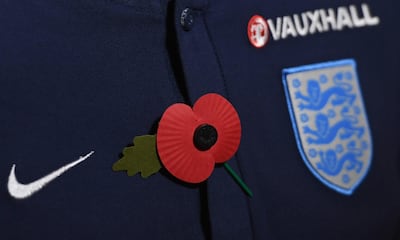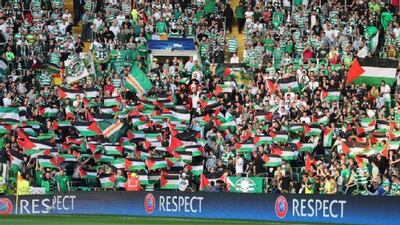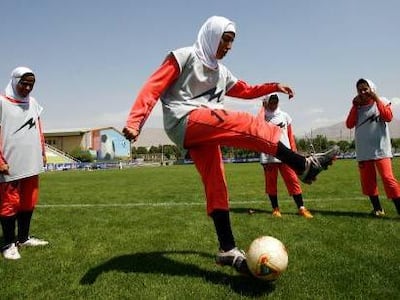Following Manchester City manager Pep Guardiola defying the English football authorities again on Sunday, by wearing a yellow ribbon on his suit in support of jailed pro-independence Catalan politicians during his side's 3-0 League Cup final victory over Arsenal at Wembley, we take a look at other political symbols used to protest in sport.

Wearing poppies
England, Northern Ireland, Scotland and Wales were all fined by Fifa in November 2016 for ignoring warnings not to commemorate Armistice Day during their World Cup qualifiers by wearing poppies on their shirts.
The world governing body considered the poppy a political symbol, sparking widespread condemnation in Britain, with Prime Minister Theresa May calling it “utterly outrageous” in Parliament.
However after the rules were revised in September 2017, the four nations were allowed to display the red poppy on their shirts or black armbands to remember fallen service men and women killed in conflict.

Save Gaza wristband
England cricketer Moeen Ali was banned from wearing “Save Gaza” and “Free Palestine” wristbands in the remainder of the third Test against India in Southampton in July 2014 by the International Cricket Council.
The England & Wales Cricket Board had cleared Ali to wear the bands, arguing that he was making a humanitarian statement and not a political one. The team also wore the logo of the Help for Heroes charity on their shirts on the Tuesday of that Test to commemorate the 100th anniversary of the outbreak of the First World War.

Statue of Liberty
The International Olympic Committee's dubious helmets panel (they probably have one, right?) were kept extra busy during the recently concluded 2018 Winter Olympics in Pyeongchang.
South Korean women's goaltender Shin So-jung was told she was not allowed to display an image of her late father on her helmet at the Games, while images of the Statue of Liberty were allowed on the helmets of two US goaltenders after a misunderstanding about whether they violated an Olympic ban on political symbols.
The IOC also stopped South Korean male hockey goalie Matt Dalton from wearing a mask with the image of Korean admiral Yi Sun-shin who inflicted defeats on Japan in a 16th century war.

Palestine flag
Scottish club Celtic were fined £8,616 (Dh44,381) in September 2016 by European football governing body Uefa after fans displayed an "illicit banner" during their Champions League qualifier against Hapoel Be'er Sheva.
Fans of Celtic flew Palestine flags before and during the match against the Israeli opposition at Parkhead on August 17 of that year, resulting in a charge from European football's governing body.
Uefa views the flags as illicit banners under Article 16 of its disciplinary regulations and at a disciplinary hearing the complaint against the Scottish champions was upheld and the club were fined.
In response, supporters of Celtic, known as the Green Brigade, donated £176,000 to two Palestinian charities through crowdfunding initiatives.

Headscarves and hijabs
In July 2012, football's rules-making panel approved headscarves for Muslim women players, reversing a ban on the Islamic hijab that was enforced in Fifa competitions for five years.
The laws of football prohibit equipment that is dangerous or makes religious statements and headscarves had been banned on the football field since 2007.
The move came after a campaign in favour of the hijab from Fifa vice-president and executive committee member Prince Ali Bin Al Hussein of Jordan.
In 2011, the Iran women's football team were prevented from playing their 2012 Olympic second-round qualifying match against Jordan because they refused to remove their hijabs before kick off.

Black power salute
Sports Illustrated said it was the most reproduced image in the history of the Olympics: two American athletes stand atop the medal platform, their heads bowed and their right hands raised to the sky, fists clenched in protest.
At the 1968 Mexico City Olympics American sprinter Tommie Smith won the 200 metres and fellow countryman John Carlos came in third.
The athletes received their medals and took the the platform for the national anthem. When the Star Spangled Banner began both Carlos and Smith performed the "Black Power salute".
Carlos and Smith were protesting the treatment of black Americans and other minorities in the United States. They were roundly booed when they left the podium and both were expelled from the Games.

Taking a knee
In 2016, San Francisco 49ers quarterback Colin Kaepernick took a knee during the national anthem to protest against racial injustice and police brutality in the United States.
Throughout the 2017 season, dozens on players on many teams chose to sit or kneel during the US national anthem at the start of games in support of Kaepernick.
The move sparked mass debate across the country as to whether NFL games were the right platform to stage social and political protest. For the players concerned, this did not amount to disrespect for flag or country. In the vaunted land of the free, they wished freely to register concern about issues of race and justice.
An undeniably divisive president, Donald Trump, saw it differently. He said NFL team owners should fire anyone making such a gesture.

Black armbands
Henry Olonga and teammate Andy Flower made international headlines in 2003 when they wore black armbands to in a World Cup game against Namibia at the Harare Sports Club to "mourn the death of democracy" in Zimbabwe under the government of autocrat Robert Mugabe.
Flower, the country's most successful player, and Olonga, the first black cricketer to represent Zimbabwe, knew they were throwing away their international careers when they issued a statement to journalists condemning Mugabe's brutal land reforms against white farmers.
A warrant was issued in Zimbabwe for Olonga's arrest on charges of treason. Death threats made him go temporarily into hiding, and then into exile in England after Zimbabwe's last match of the tournament, against Sri Lanka in East London.

